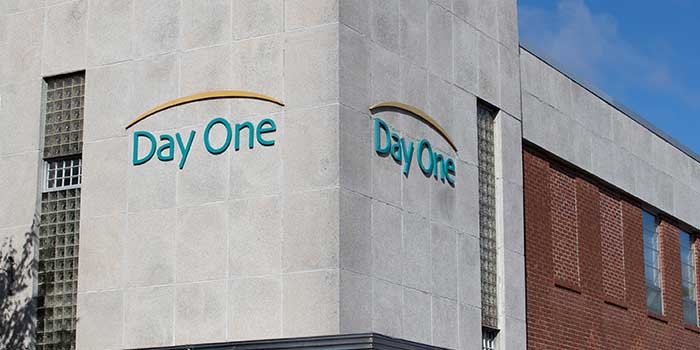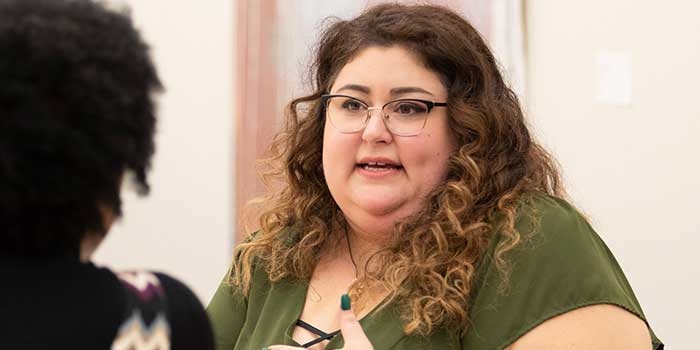Alumna Develops R.I.’s First Uniform Response Protocol for Child Pornography
- News & Events
- News
- Alumna Develops R.I.’s First Uniform Response Protocol for Child Pornography

Angela Kemp ’18, project manager for Day One

RIC M.S.W. graduate and Day One Project Manager Angela Kemp has developed Rhode Island’s first Uniform Response Protocol for Child Pornography in partnership with members of the Department of Children, Youth and Families (DCYF), the Rhode Island State Police, the Internet Crimes Against Children (ICAC) task force, the Rhode Island Attorney General’s Office, the United States Attorney’s Office and the Federal Bureau of Investigations.
Day One is the only agency in Rhode Island that focuses primarily on sexual violence. In 2018, a month before graduating from RIC, Kemp was hired by Day One to develop a protocol for cases involving child pornography. That initiative was completed this year.
“We want the public to know how these cases will be handled going forward,” she explained. The goal is to enhance coordination among team members who may include law enforcement; prosecutors; DCYF; victim advocates; and mental health, medical and other service providers. Kemp’s goal is also to inform the public about a crime that is not widely understood.

Child pornography, as defined by the federal government, is any visual depiction of sexually explicit conduct involving a minor (any person under the age of 18). It is a crime to produce (direct, manufacture, issue, publish, advertise) or possess (via books, magazines, periodicals, films, videotapes, computer disks, computer files or any other material) child pornography.
But this wasn’t always the case. It wasn’t until the Protection of Children Against Sexual Exploitation Act was passed in 1977 that child pornography became a federal crime. In 1996 restrictions against child pornography on the Internet, including computer-generated images, was added to the federal criminal code. By 1998 the Internet Crimes Against Children (ICAC) task force was created and has since established offices in every state. ICAC is made up of local state police officers in search of offenders.
“ICAC conducts both proactive and reactive investigations,” said Kemp. “Police will proactively spend time in [online] chat rooms, where perpetrators trade child pornography and solicit sexual activity with a minor, and police will pose as potential victims.”
Two relatively new forms of child exploitation are sextortion and sexting. Sextortion occurs primarily online and involves blackmailing a minor to acquire sexual content (photos/videos) of the child, obtain money from the child or engage in sex with the child. Sexting, which also occurs electronically, is when a minor knowingly and voluntarily disseminates visual depictions of themselves engaging in sexually explicit behavior.
While sextortion is a criminal offense, sexting is not in Rhode Island. Because the offender is a minor, sexting is referred to Family Court. However, if a minor consensually shows their image to another minor and then that minor un-consensually distributes it to other people, it is considered child pornography distribution and becomes a criminal offense.
“It is estimated that one in four girls and one in six boys will report being sexually assaulted before they turn 18,” Kemp said. To lower that statistic, we need to change culture and environments, she said.
“We need to change the culture that perpetuates and tolerates sexual violence and change environments to be more protective. I think we’re already in the middle of a culture change when it comes to sexual violence,” she said, referring to the #MeToo Movement. “Culture changes when victims speak out. I know it’s an incredibly scary thing to do but that’s why we’re trying to build systems that allow people to be vulnerable, to feel comfortable in reporting. If that doesn’t happen, we’re not going to make those changes and we’re not going to hold people accountable who harm.”
If an individual suspects that someone is engaged in child pornography, they are asked to call the national toll-free hotline at the National Center for Missing and Exploited Children – 1-800-843-5678. The center will then notify the local ICAC task force. Victims of child pornography and all forms of sexual violence can contact Day One at 401-421-4100.
